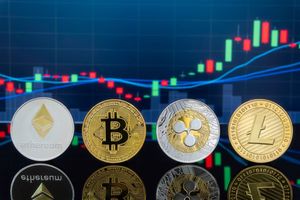
What Happened?
Shares of financial services company Robinhood (NASDAQ: HOOD) jumped 8.7% in the afternoon session after crypto-linked stocks rebounded sharply as Bitcoin broke above the $90,000 mark, reinforcing investor confidence in digital assets. The rally coincided with a weakening US dollar, which appeared to boost demand for assets considered alternative stores of value. Crypto, especially Bitcoin, has been evolving to be one of those spots people flock to when they're worried about inflation or the dollar losing value.
Bitcoin's strength not only lifted sentiment across the broader crypto market, but also drove gains in related equities, such as mining firms and blockchain technology providers. The market reaction likely reflected expectations of rising trading activity, which typically translates into higher volumes, stronger sales, and profits for crypto tech providers.
Separately, stocks rallied as investor sentiment improved on renewed optimism that the US-China trade conflict might be nearing a resolution. Treasury Secretary Scott Bessent reinforced this positive outlook by describing the trade war as "unsustainable," and emphasized that a potential agreement between the two economic powers "was possible." His comments signaled to markets that both sides might be motivated to seek common ground, raising expectations for reduced tariffs and more stability across markets.
Is now the time to buy Robinhood? Access our full analysis report here, it’s free.
What The Market Is Telling Us
Robinhood’s shares are extremely volatile and have had 54 moves greater than 5% over the last year. In that context, today’s move indicates the market considers this news meaningful but not something that would fundamentally change its perception of the business.
The previous big move we wrote about was 6 days ago when the stock dropped 9% on the news that Federal Reserve Chair Jerome Powell signaled a cautious stance on future monetary policy decisions during a speech in Chicago, emphasizing that trade tariffs could add upward pressure to inflation in the short term and complicate the Fed's efforts to stabilize the economy. He warned that such trade measures are "likely to move us further away from our goals," referring to the Fed's dual mandate of price stability and maximum employment.
The comments did little to improve sentiment, as major indices were already in the negative territory in the morning session after Nvidia announced it might be unable to sell some high-end chips (including the H20 chips) to China due to export controls and requirements from the Trump administration. As a result, the company planned to take a $5.5 billion charge due to inventory writedowns and canceled sales.
Adding to the sector's pressure, chip tool maker ASML posted weak bookings (a key demand indicator) which fell below Wall Street's expectations, noting that tariffs had made the industry's outlook more uncertain. Taken together, these updates likely fueled investor anxiety, amplifying concerns about global trade tensions, tech sector vulnerability, and the Fed's limited room to maneuver in an increasingly uncertain macro environment.
Robinhood is up 7.5% since the beginning of the year, but at $42.42 per share, it is still trading 35% below its 52-week high of $65.28 from February 2025. Investors who bought $1,000 worth of Robinhood’s shares at the IPO in July 2021 would now be looking at an investment worth $1,218.
Today’s young investors won’t have read the timeless lessons in Gorilla Game: Picking Winners In High Technology because it was written more than 20 years ago when Microsoft and Apple were first establishing their supremacy. But if we apply the same principles, then enterprise software stocks leveraging their own generative AI capabilities may well be the Gorillas of the future. So, in that spirit, we are excited to present our Special Free Report on a profitable, fast-growing enterprise software stock that is already riding the automation wave and looking to catch the generative AI next.





